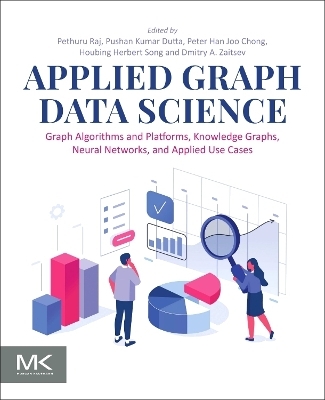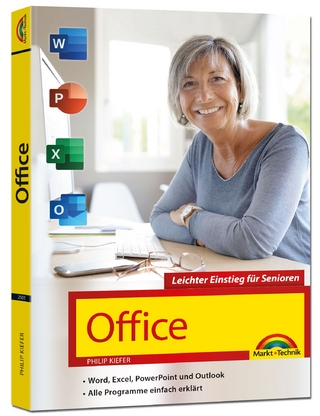
Applied Graph Data Science
Morgan Kaufmann Publishers In (Verlag)
978-0-443-29654-3 (ISBN)
- Noch nicht erschienen (ca. Februar 2025)
- Versandkostenfrei innerhalb Deutschlands
- Auch auf Rechnung
- Verfügbarkeit in der Filiale vor Ort prüfen
- Artikel merken
Pethuru Raj PhD works as chief architect and vice president of site reliability engineering (SRE) division of Reliance Jio Infocomm. Ltd. Bangalore. Previously he worked as a cloud infrastructure architect in the IBM Global Cloud Center of Excellence (CoE), Bangalore. He worked as a TOGAF-certified enterprise architecture (EA) consultant in Wipro Consulting Services (WCS) Division and as a lead architect in the corporate research (CR) division of Robert Bosch, India. He has gained more than 18 years of IT industry experience. He finished the CSIR-sponsored PhD degree in Anna University, Chennai and continued the UGC-sponsored postdoctoral research in the department of Computer Science and Automation, Indian Institute of Science, Bangalore. Thereafter, he was granted a couple of international research fellowships (JSPS and JST) to work as a research scientist for 3.5 years in two leading Japanese universities. He has authored and edited 18 books thus far and he focuses on some of the emerging technologies such as Containerized Clouds; Big, Fast, and Streaming Data Analytics; Microservices architecture (MSA); Machine and Deep Learning Algorithms; Blockchain Technology; The Internet of Things; and Edge Computing. He has published more than 30 research papers in peer-reviewed journals such as IEEE, ACM, Springer-Verlag, Inderscience, etc. Pushan Kumar Dutta is a distinguished Assistant Professor Grade III at Amity University Kolkata, specializing in Electronics and Communication Engineering. He holds a PhD from Jadavpur University and completed a postdoctorate with scholarship from Erasmus Mundus Association at the University of Oradea, Romania. Dr. Dutta has an extensive research background with diverse interests including data mining, AI, edge computing, predictive analytics, and earthquake precursor study. His expertise is recognized globally through keynote speeches delivered at international events like the Data Science Europe summit. In addition to his academic pursuits, Dr. Dutta actively mentors’ students and coordinates sports and innovation competitions at Amity University Kolkata. He teaches classes on IoT (Internet of Things), robotics, and engineering while being involved in various technical programming committees for prestigious conferences worldwide. Furthermore, his achievements include receiving the ATAL NITI Aayog Mentor of Change recognition from NITI Aayog (National Institution for Transforming India). Under his guidance, a group won Best Presentation award worth $1000 during Tech Connections session held by Johnson Controls. Dr. Dutta’s passion for education is evident through his copyright entitled 'Innovative Digital Teaching and Learning for Professional Readiness'. Professor Peter Han Joo Chong is the Associate Head of School (Research) at the School of Engineering, Computer and Mathematical Sciences, Auckland University of Technology, New Zealand. Between 2016 and 2021, he was the Head of Department of Electrical and Electronic Engineering at AUT. He received the B.Eng. (with distinction) in Electrical Engineering from the Technical University of Nova Scotia, Canada, in 1993, and the M.A.Sc. and Ph.D. degrees in Electrical and Computer Engineering from the University of British Columbia, Canada, in 1996 and 2000, respectively. He has visited Tohoku University, Japan, as a Visiting Scientist in 2010 and Chinese University of Hong Kong (CUHK), Hong Kong, between 2011 and 2012. He is currently an Adjunct Professor at the Department of Information Engineering, CUHK. He is an Honorary Professor at Amity University, India. He is a Fellow of the Institution of Engineering and Technology (FIET), UK. Prof. Chong is listed in the World's Top 2% Scientists published by Stanford University in 2022. Before joining AUT in 2016, Professor Chong was an Associate Professor (tenured) from July 2009 to April 2016 and Assistant Professor from May 2002 to June 2009 at the School of Electrical and Electronic Engineering, Nanyang Technological University (NTU), Singapore. Between 2011 and 2013, he was the Assistant Head of Division of Communication Engineering. Between 2013 and 2016, he was the Director of Infinitus, Centre for Infocomm Technology. He was the recipient of ‘EEE Teaching Excellence Award’ and ‘Nanyang Award Excellence in Teaching’ in 2010, and ‘Nanyang Education Award (College)’ in 2015. In 2015, he became a Fellow of the Teaching Excellence Academy in NTU. From February 2001 to May 2002, he was with the Radio Communications Laboratory at Nokia Research Center, Finland. Between July 2000 and January 2001, he worked in the Advanced Networks Division at Agilent Technologies Canada Inc., Canada. He co-founded P2 Wireless Technology in Hong Kong in 2009 and Zyetric Technologies in Hong Kong, New Zealand and US in 2017. His current research projects focus on machine learning techniques applied to software defined vehicular networks. He has been developing techniques of deep reinforcement learning (DRL)-based resource management for future 5G-V2X networks. His research interests are in the areas of wireless/mobile communications systems including radio resource management, multiple access, MANETs/VANETs, green radio networks and 5G-V2X networks. He has published over 300 journal and conference papers, 1 edited book and 13 book chapters in the relevant areas. Houbing Song, Security and Optimization for Networked Globe Laboratory, University of Maryland, Baltimore County (UMBC), Baltimore, USA. His research interests include cyber-physical systems, cybersecurity and privacy, IoT, big data analytics, connected vehicles, smart health, wireless communications, and networking. Dr. Song has edited and authored several books in the field, including Cyber-Physical Systems: Foundations, Principles and Applications. Dmitry A. Zaitsev received the Eng. degree in applied mathematics from Donetsk Polytechnic Institute, Donetsk, Ukraine, in 1986, the Ph.D. degree in automated control from the Kiev Institute of Cybernetics, Kiev, Ukraine, in 1991, and the D.Sc. degree in telecommunications from the Odessa National Academy of Telecommunications, Odessa, Ukraine, in 2006. He is a professor of Computer Science Department, University of Information Technology and Management in Rzeszow, senior member of the ACM and IEEE, recently visiting professor to Université Côte d’Azur, France. In 2017, he was a visiting professor to The University of Tennessee Knoxville, USA on a Fulbright scholarship, working in the Innovative Computing Laboratory headed by Jack Dongarra. As a result, a joint paper was published and software ParAd issued. Dmitry A. Zaitsev developed: theory of linear system clans; small universal Petri and Sleptsov nets in explicit form; generalized neighbourhood for cellular automata; theory of infinite Petri nets; Sleptsov net computing; equivalent transformations of timed Petri nets, algorithm for fuzzy logic function synthesis. He designed the Opera-Topaz system for production control, models of protocols and networking technologies TCP, BGP, IOTP, MPLS, Bluetooth, PBB, offered and implemented in the Linux kernel a new stack of networking protocols E6.
1. Introduction to Graph neural network: A systematic review of trends, methods, and applications
2. Chronological Reasoning in Knowledge Graphs using AI and ML
3. Graph-based Approach on Financial Fraudulent Detection and Prediction
4. The Power of Graph Neural Networks: From Theory to Application
5. Delineating Graph Neural Networks (GNNs) and the Real-World Applications
6. Graph Techniques for Enhancing Knowledge Graph Integration: A Comprehensive Study and Applications
7. Graphs, Language Models, and NLP: The Future of Search Engines
8. Demystifying Digital Transformation Technologies and Tools
9. Innovative Feature Engineering Methods for Graph Data Science
10. Graph Neural Networks: Insight and Applications
11. Graph-Theoretic Analysis for Eco-Efficient Textile Weaving Patterns
12. Quantum-assisted Graph Networks: Algorithmic Innovations and Optimization Strategies for Large-Scale Social Communities.
13. Using Physics-Informed AI and graph based Quantum Computing for Natural Catastrophic Analysis: Future Perspectives
14. Integration of Machine Learning (ML) and Deep Learning (DL) Algorithms in Knowledge Graph for Disease Screening and Cataloging: Tools and Approaches for Drug Invention and Additive Manufacturing
15. Analysing Social network with dynamic graphs: unravelling the ever evolving connection
16. Transforming E-commerce with Graph Neural Networks (GNNs): Enhancing Personalization, Security, and Business Growth
17. On Rings Domination in Soft Graphs
18. Graph Data Science: Applications and Future
19. Verification of MPI programs via compilation into Petri nets
20. Demonstration and Analyzing the Performance of Image Caption Generator: An Efforts for Visually Impaired Candidates for Smart Cities 5.0
| Erscheint lt. Verlag | 1.2.2025 |
|---|---|
| Verlagsort | San Francisco |
| Sprache | englisch |
| Maße | 191 x 235 mm |
| Themenwelt | Mathematik / Informatik ► Informatik |
| ISBN-10 | 0-443-29654-5 / 0443296545 |
| ISBN-13 | 978-0-443-29654-3 / 9780443296543 |
| Zustand | Neuware |
| Haben Sie eine Frage zum Produkt? |
aus dem Bereich


